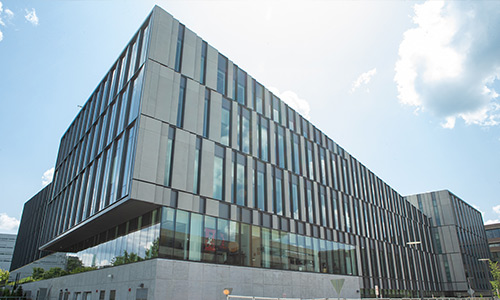First person
How UC prepared me for journalism
By German Lopez, A&S '12
When I first got into the University of Cincinnati, I didn’t really know what I wanted to do. Ultimately I majored in journalism and minored in history. But I wasn’t sure if I would want to make any of those interests into a career.
That changed the first time I wrote for The News Record, the student-run newspaper at UC. It felt sensational. I remember feeling astonished that I could get paid and make a career out of learning things and then sharing what I learned with the world. As someone who already spent so much of his time reading articles and books and talking to experts and other politics and policy aficionados, it was like getting paid to do my hobby.
Yet today, that’s exactly what I do for Vox.com, a national news outlet. I came into Vox shortly before it was founded in 2014, hired as a writing fellow before working my way up to staff writer, then senior reporter and now senior correspondent. The idea behind Vox was to provide context around the world’s events. The New York Times, The Washington Post and many local news outlets out there will always be quick to cover the day’s news — but they’ll often leave out the context that led to the latest events. Filling that contextual gap is where Vox comes in.
My work here focuses on criminal justice, guns and drugs — often covering the country’s opioid epidemic.
There have been all sorts of stories on what caused the opioid crisis and how bad it is — the irresponsible marketing by drug companies, the flood of illicit synthetic opioids over the border, the 70,000 drug overdose deaths in 2017. What I wanted to figure out: We know what caused this crisis and how bad it is, but how do we fix it?
“UC fostered my relentless curiosity. Without that, I don’t think I’d have the hunger for learning that helps me get to the bottom of the story and explain the news.”
It’s taken a lot of digging. I went to Virginia and met Fawn Ricciuti, who’s used the medication Suboxone to stabilize her opioid addiction so she could take care of her kids, go back to school and dream of a new career as a restauranteur. I traveled to Baltimore and met Michael Rice, who stopped using heroin after decades thanks to a low-threshold treatment. I visited California and saw how some emergency rooms start people on treatment. I went to Vancouver and met patients like John Pinkney, who said his life was saved by the city’s liberal approach to harm reduction and treatment (which, as someone from the U.S., I was initially a bit skeptical of). And I dove into a lot of the scientific literature, reading dozens if not hundreds of studies about what can work to treat addiction.
It’s been exhausting work. But I learned through all of this that there are ways to stop the opioid epidemic. And I could only pull that out of this story — which is often covered with such a focus on the despair of the crisis — by tapping into my curiosity to dig, dig, dig.
That goes back to UC, which fostered my relentless curiosity. Without that, I don’t think I’d have the hunger for learning that helps me get to the bottom of the story and explain the news.
Curiosity came in journalism classes, where professors pushed me to back up my writing with stronger reporting and make it clearer. It came in history classes, where I learned that issues that seem simple at face value can have centuries of relevant context. It came even in classes I wrote off as a student, because, it turns out, knowing a bit about statistical modeling is helpful when I’m spending a lot of my time reading research.
And it came, of course, at The News Record, where as peers we all pushed each other to make the best damn newspaper possible. We could only do that, though, if we really got to the bottom of the stories affecting students in their day-to-day lives.
Now at Vox, I get paid to share what I learn. And I love it.
FEATURE STORIES
The nonprofit Village Life Outreach Project has sent hundreds of volunteers from UC to three remote villages in East Africa since it started 15 years ago, an effort that has deeply impacted countless lives on both sides of the world.
UC has invested $100,000 in Cincinnati nonprofits to commemorate the Bicentennial's impact in the community.
The new home of the University of Cincinnati’s business college is built to foster collaboration, adapt to future needs. Also featured is the brand new Allied Health Sciences building.







